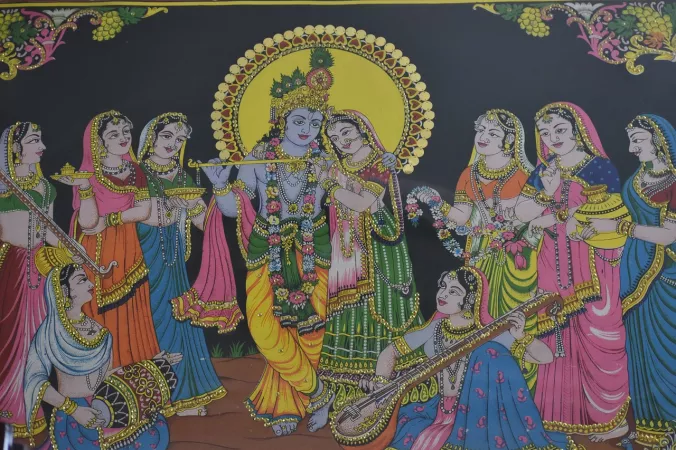Kamalabari Satra Travel Guide
Kamalabari Satra, located in Majuli, Assam, is a significant cultural and historical destination in India. The island of Majuli is the largest river island in the world and is known for its rich cultural heritage and natural beauty. Kamalabari Satra is a Vaishnavite monastery that dates back to the 16th century and serves as a center for traditional Assamese arts, music, and dance. The serene surroundings and spiritual ambiance make it a popular destination for tourists seeking a unique cultural experience.Top Attractions in Kamalabari Satra
- Visit the Kamalabari Satra monastery
- Enjoy traditional Assamese music and dance performances
- Explore the scenic beauty of Majuli island
- Interact with the local artisans and learn about traditional crafts
Kamalabari Satra is Famous for
Its vibrant cultural heritage and traditional performing arts.Top Attractions in Kamalabari Satra
- Visit the Kamalabari Satra monastery
- Enjoy traditional Assamese music and dance performances
- Explore the scenic beauty of Majuli island
- Interact with the local artisans and learn about traditional crafts
What's Great about Travelling to Kamalabari Satra?
- Immerse yourself in traditional Assamese culture
- Experience the peaceful and spiritual atmosphere
- Explore the unique island setting of Majuli
What's Not So Great about Travelling to Kamalabari Satra?
- Limited accommodation options on the island
- Remote location may require additional travel time
- Monsoon season can cause transportation disruptions
Travel Tips for Kamalabari Satra
- Obtain the necessary permits for visiting Majuli island
- Plan your trip during the winter months for pleasant weather
- Book accommodation in advance due to limited availability
Important Kamalabari Satra trip information
- Ideal Duration: 2-3 days
- Best Time to Visit: November to February
- Nearby Airports and Railway Stations: Jorhat Airport and Jorhat Railway Station
FAQ's on Kamalabari Satra
Q1: What is the best time to visit Kamalabari Satra?
Kamalabari Satra is best visited during the winter months from November to February when the weather is pleasantly cool and ideal for exploring the cultural heritage of the region. This time also coincides with the Raas Leela festival, a major cultural event in the area. Avoid the monsoon season from June to September due to heavy rainfall that can disrupt travel plans.
Q2: Do I need a visa to travel to Kamalabari Satra?
Tourists visiting Kamalabari Satra in India need a valid Indian visa. However, travelers from certain countries may be eligible for an e-Visa, allowing them to apply online for a visa. It is advisable to check the specific visa requirements based on your nationality before planning your trip.
Q3: What are the must-visit attractions in Kamalabari Satra?
Kamalabari Satra is renowned for its rich cultural heritage and must-visit attractions include the Kamalabari Satra monastery, Majuli Island, Auniati Satra, and the Samaguri Satra. Visitors should also explore the traditional mask-making workshops, pottery centers, and enjoy the serene beauty of the Brahmaputra River.
Q4: Is Kamalabari Satra a safe place to travel?
Kamalabari Satra is a safe destination for travelers, but like any place, it's recommended to stay cautious and be aware of your surroundings. Avoid isolated areas at night and take necessary precautions to safeguard your belongings. It's advisable to check with locals or tour guides for any specific safety concerns.
Q5: What is the local currency in Kamalabari Satra and can I use credit cards?
The local currency in Kamalabari Satra is the Indian Rupee (INR). While credit cards are accepted in some hotels and larger establishments, it's advisable to carry cash for smaller purchases and in rural areas. ATMs are available in nearby towns for convenient cash withdrawals.
Q6: What is the local cuisine like in Kamalabari Satra?
The local cuisine in Kamalabari Satra offers a blend of Assamese flavors with dishes like Masor Tenga (sour fish curry), Aloo Pitika (mashed potatoes), and Pitha (rice cakes). Vegetarians can enjoy dishes like Khar (alkaline preparation) and Omita Khar (papaya khar). Don't miss the traditional Assamese thali for a wholesome culinary experience.
Q7: What transportation options are available in Kamalabari Satra?
Transportation options in Kamalabari Satra include local buses, auto-rickshaws, and taxis for short distances. Hiring a bicycle or motorcycle is a popular choice for exploring the island. Ferries and boats are used for river crossings and offer a unique way to experience the scenic beauty of Majuli Island.
Q8: Are there any cultural norms or etiquette I should be aware of when visiting Kamalabari Satra?
When visiting Kamalabari Satra, it's important to respect the local customs and traditions. Dress modestly when visiting religious sites and remove shoes before entering monasteries. Seek permission before taking photographs of locals and respect their privacy. Greeting with a Namaskar (folded hands) is a common gesture of respect. Avoid public displays of affection and be mindful of your behavior to ensure a pleasant and respectful interaction with the locals.
Q9: I am a travel agent. How can I buy travel leads of Kamalabari Satra?
Register yourself as a travel agent at agents.tripclap.com and then you can buy travel leads to Kamalabari Satra once your account is approved. For more details contact our support team at +91-8069186564 or support@tripclap.com

